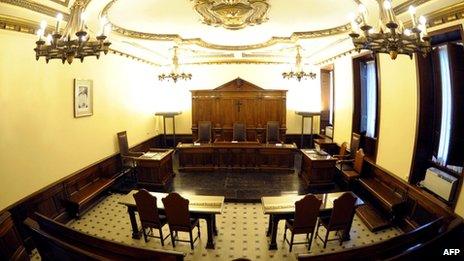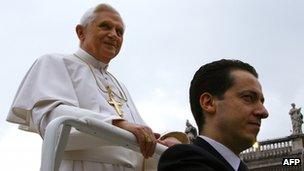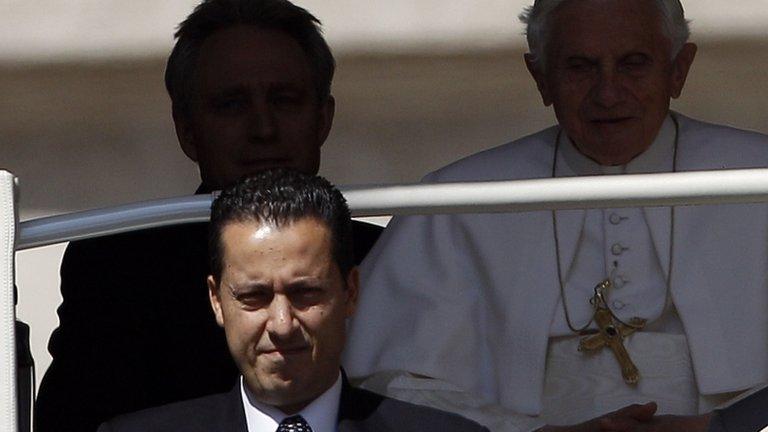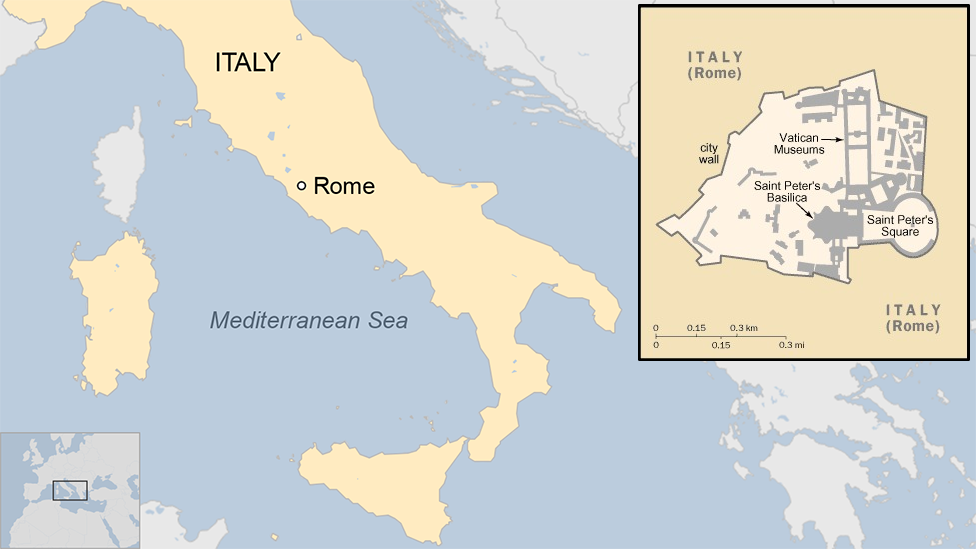Vatican embarrassment as Pope's butler goes on trial
- Published

This is the courtroom chosen for the trial
Pope Benedict's 46-year-old former butler, Paolo Gabriele, goes on trial in a small and rarely used courtroom inside Vatican City before a panel of three judges, on charges of stealing an "enormous" quantity of secret and confidential documents from the pontiff's desk.
The theft marks the biggest breach of security in the Vatican in modern times.
An Italian computer technician who used to work in the equivalent of the Papal Cabinet Office, the Secretariat of State, is also charged with aiding and abetting Mr Gabriele.
If found guilty, the butler could face up to four years' imprisonment in an Italian jail, as Vatican City - the world's smallest state - has no long-term detention facilities on its territory. The technician, Claudio Sciarpelletti, faces up to a year in prison if found guilty.
Mr Gabriele has admitted his guilt to investigators but has not yet entered a plea in court.
The formal charge is "aggravated theft" because of where the alleged crime took place - inside what was supposed to be the most secure area of the Pope's domain right in the centre of Rome, the papal penthouse apartment on the top floor of the Apostolic Palace.
Mr Gabriele is alleged to have handed photocopies of many of the stolen documents to an Italian journalist who published facsimile copies of them in a book earlier this year, cataloguing corruption and petty rivalry among top-level Vatican administrators.
The Vatican says he also gave another set of copies to an Italian priest - described as his "spiritual adviser" - who decided to burn them. The unnamed priest told Mr Gabriele to confess only to the Pope himself what he had done.
Trusted employee
Mr Gabriele, a trusted employee who is married with three children, held the keys to the Pope's apartments.
A fervent Catholic used to attending the Pope's private Mass celebrated each morning, he has spent his entire working life so far in the service of the Vatican.
He used to ride up front next to the chauffeur in Pope Benedict's Popemobile, and served the pontiff's meals at table in the Apostolic Palace.

This archive image shows Paolo Gabriele arriving at the Vatican with Pope Benedict in 2006
He has already confessed to Vatican investigators that he took the papers, although he initially denied having done so when confronted last May by Pope Benedict's private secretary, Monsignor Georg Gaenswein. He has written a letter of apology to the Pope and has already asked for a pardon.
The Vatican City's criminal and civil judiciary is staffed by Italians, many of whom have other jobs in Rome.
The Vatican criminal code is based closely on Italian legal practice. Last year the court heard some 220 cases, mainly involving petty crimes such as pickpocketing committed by a tiny fraction of the 18 million people who enter Saint Peter's Basilica or the Vatican Museums each year. The court normally meets only on Saturdays.
No witness list has been issued nor is it even certain whether Mr Gabriele and Mr Sciarpelletti will be present in person for the opening of their trial. They have the option not to attend.
Vatican reporters have drawn lots for the privilege of attending the court proceedings. Only eight reporters are being allowed inside, and TV cameras have been banned.
Journalists will have to hand in their mobile phones to Vatican security staff to prevent them tweeting or communicating with the outside world until the morning session has ended and they have briefed the numerous members of the Vatican Press Corps waiting for information at the Press Centre.
None of the hundreds of priests, bishops and cardinals who work inside the Holy See, the central administration of the Roman Catholic Church, have been charged in connection with this very serious breach of security.
'Evil and corruption'
A committee of cardinals set up by Pope Benedict to investigate the circumstances of what has become known as the "Vatileaks" scandal has reported back to the pontiff, but their findings are still secret as internal enquiries are still going on to try to determine whether Mr Gabrieli and Mr Sciarpelletti acted alone or were part of a conspiracy involving senior aides to the Pope.
Mr Gabriele told investigators that his motive in stealing documents from the Pope's desk was to try to save the Church from the "evil and corruption" that he saw around him.
He said he believed Pope Benedict was not being correctly informed by his staff and that in making certain documents known to the media he would deliver a "salutary shock" which would set the Church back on its right tracks. He was doing all this as "the agent of the Holy Spirit".
Vatican investigators had Mr Gabriele assessed by two psychiatrists to ascertain whether he had mental problems.
One reported back that he had a "fragile personality" and another that he had "grandiose" ideas coupled with a need for constant reassurance that he was being appreciated in his work. But neither found him unable to understand the consequences of his acts.
More than 200 Catholic Bishops from around the world are due to arrive in Rome shortly for a three-week conference on how to check the falling away from the faith of millions of European Catholics and how to inspire a new evangelisation.
It will be in the Vatican's interest to ensure a rapid conclusion to the "Vatileaks" trial which has become the source for considerable embarrassment in the higher echelons of the Roman Catholic Church.
- Published22 December 2012

- Published17 November 2023
